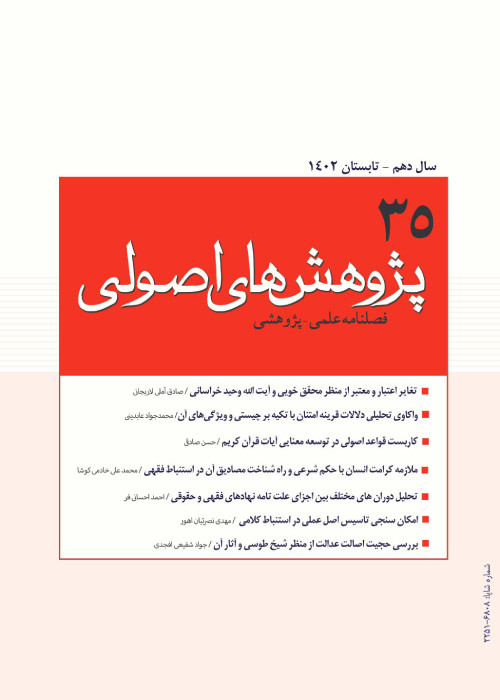فهرست مطالب
فصلنامه پژوهش های اصولی
پیاپی 20 (بهار 1393)
- بهای روی جلد: 40,000ريال
- تاریخ انتشار: 1393/03/20
- تعداد عناوین: 6
- مقالات عربی
-
صفحه 8
- مقالات فارسی
-
صفحه 114
- احیاء تراث
-
صفحه 138
-
Page 26
Scholar Al-Iraqi has special definition for Usul, we can extract his definition from his answer to the routine question about definitions, where he said: "the proposition of Usul, is the propositions which use for inferring rules of Sharia, in a manner that used for proving rule in itself or proving the qualification of the relation between rule and its subject matter." He omitted the word of Al-Elm in the beginning of his definition and transform Al-Estenbaat to Al-Estefada. According to his definition rules includes rules pertain to Divine law and rational ruling. Other scholars have criticizes his definition. This paper elaborates Al-Iraqi's definition and answers to some of the considerations about his definition, finally we accept some of considerations.
Keywords: definition of Usul, not inclusive, not exclusive, proving the rule, qualification of the relation between rule, its subject matter -
Page 54
There is not any clear answer to newfound problems in the writings and Fatwa of jurists (Faqih). There are some solutions for newfound problems: first: exploration of the main goals of the Law giver (Shari'), second: knowing the stated subject of rules, third: knowing the factors of variation of the subject of rules, fourth: exploration of the cause and criteria of rules for expanding or restricting of rules, fifth: exploration of secondary factors related to the discussion, sixth: execution of procedural principles and seventh: Expediency Discernment and specifying the governmental rule. Accessing to prima-facie meaning (Zohur) of the text of Quran and tradition is the most important resolvent and without it Jurist cannot resolve newfound problems.
Keywords: newfound problems, methods of resolvent newfound problems, rules of accessing to prima, facie meaning -
Page 88
The appearance of implicit meaning (Mafhum) is less than the appearance of explicit meaning (Mantugh), so there is not any possibility for denying explicit meaning (Mantugh) unlike implicit meaning (Mafhum). The implicit meaning of exceptional particles restricts the meaning. It is one of the opposite implicit meanings that all scholars consensus on its appearances and probativity, but Abu Hanifa have denied it. This article discusses firstly about routine words that used for implicit meanings and secondly proposes and rejects the theory of Abu Hanifa.
Keywords: implicit meaning (Mafhum), implicit meaning (Mafhum) of limitation, the problem of Abu Hanifa, exceptional particles -
Page 114
This article discusses about Ijtehad, its relation to jurisdiction, the argument for obligation of Ijtehad, the position of object in Ijtehad, spatio-temporal effects in Ijtehad and the necessity of specialization in contemporary situation. My research has concluded that: 1. The neccecety of separation between Ijtehad in general meaning and Ijtehad in special meaning. 2. Jurisprudence includes Ijtehadic and Taghlidi understanding. 3. For proving the obligation of Ijtehad we must appeal to the argument such as: the argument of the obligation of protecting system of humanity and the argument of the obligation of protecting sharia'. 4. Ijtehad includes the knowing of the object the rulling. 5. The principle of Ijtehad are philology and Arabic litetature, the science of Rijal, the science of typology of traditions (Diraya'), knowing Quran and traditions, Usul Al-Fegh, logic, mathematics, astrology, theology, economics, politics, sociology, banking, history, philosophy (in Ijtehad in general meaning). 6. Because of the variety of problems the specialization of Ijtehad is necessary.
Keywords: Ijtehad, principles of Ijtehad, specialization of Ijtehad, knowing the object in ijtehad


